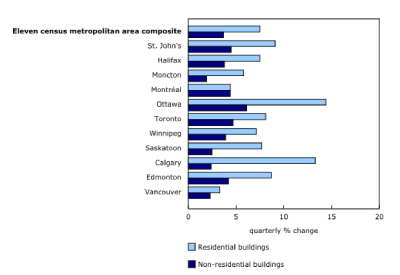National Building Construction Prices Rise 7.5% in Second Quarter 2021

August 12, 2021
Residential building construction prices rose 7.5% in the second quarter, the largest increase since the series began in 2017, accelerating from a 4.9% increase in the first quarter. Non-residential building construction prices (+3.7%) grew at their fastest pace since the second quarter of 2008.
Construction costs continue to rise in the second quarter
Construction costs for single-detached houses and apartment buildings contributed the most to the residential building construction price growth in the second quarter. The price increase for non-residential construction was mostly attributable to office buildings, warehouses and shopping centres.
Higher residential building construction prices in the second quarter were largely due to record high lumber and wood product prices. Prices for lumber and other wood products increased by 27.9% from the first to the second quarter of 2021. This price surge was due to ongoing supply chain constraints, combined with high demand for new houses and renovations in the wake of changing preferences for more space during the pandemic, as well as low interest rates. The supply chain constraints included ongoing operational delays at sawmills, as well as transportation difficulties.
Additional demand from across the border—reflected by higher values of exports of forestry products and building and packaging materials (+8.9%) in May—further added to building material shortages domestically.
Pandemic-related demand puts upward pressure on construction prices
In the second quarter, residential building construction prices rose in every census metropolitan area (CMA) covered by the survey, mainly driven by higher costs to build single-detached houses in Toronto, Calgary and Ottawa.
Higher prices for single-detached houses were partly related to the demand for more living space during the lockdowns for a home office or remote learning, and because of the increased need for lumber in building a single-detached house, relative to a multi-family dwelling.
Non-residential building construction price increases were driven by higher construction costs in Toronto, Vancouver and Montréal.
Demand for warehouse space continued to climb with retail e-commerce sales increasing by 4.8% from February to May. This increased demand, combined with supply shortages, particularly of concrete and structural steel, raised costs for non-residential construction in the second quarter.
Record year-over-year construction price growth led by Calgary, Ottawa and Toronto
Nationally, residential construction building prices increased 18.8% year over year in the second quarter—the largest increase since the data series began in 2017—led by higher construction costs for single-detached houses (+23.9%). Construction costs for residential buildings rose at the fastest pace in Calgary (+31.4%), Ottawa (+28.4%), as well as in Toronto and Edmonton (both up 22.4%) in the second quarter.
Non-residential construction building prices rose 5.7% year over year—the largest increase since the fourth quarter of 2008, led by Ottawa (+10.1%), Montréal (+8.4%) and Toronto (+7.7%).
Go HERE for more information





![Guide to the Canadian Electrical Code, Part 1[i], 26th Edition– A Road Map: Section 56](https://electricalindustry.ca/wp-content/uploads/2022/11/Guide-CE-Code-2-768x432.png)




![Guide to the Canadian Electrical Code, Part 1[i], 26th Edition– A Road Map: Section 56](https://electricalindustry.ca/wp-content/uploads/2022/11/Guide-CE-Code-2.png)



